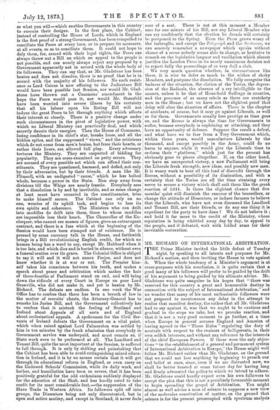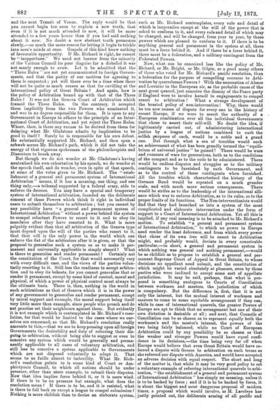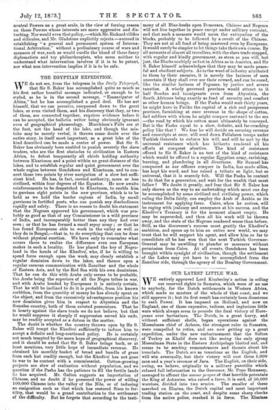MR. RICHARD ON INTERNATIONAL ARBITRATION.
THE Prime Minister invited the little defeat of Tuesday night, by speaking to all intents and purposes for Mr. Richard's motion, and then inviting the House to vote against it. When the whole tendency of a Minister's argument is at cross-purposes with his conclusion, it is quite certain that a good many of his followers will prefer to be guided by the drift of his argument to being guided by his ultimate advice. Mr. Gladstone was quite sanguine in his hopes that "there was reserved for this country a great and honourable destiny in connection with the subject of International Arbitration," and no wonder that many of his most enthusiastic followers were not prepared to countenance any delay in the attempt to realise that manifest destiny, the rather that all Mr. Gladstone had to say against it, was that we ought to be cautious and gradual in the steps we take, lest we provoke reaction, and that it is not a very good moment to go further, at a time when Europe in general accuses England and America of having agreed to the "Three Rules" regulating the duty 61 neutrals with respect to the cruisers of belligerents, in their own selfish interests, and without any reference to the interests of the chief European Powers. If these were the only objec- tions "to the establishment of a general and permanent system of International Arbitration in Europe," the House might well follow Mr. Richard rather than Mr. Gladstone, on the ground that we could not lose anything by beginning to preach our real belief at once, since, even if we are distrusted now, we shall be better trusted at some future day for having long and firmly advocated the policy to which we intend to adhere. Mr. Gladstone could hardly expect even his own followers to accept the plea that this is not_a peculiarly favourable moment to begin spreading the gospel of Arbitration. You might almost as well advise a man of science to suppress a new view. of the molecular constitution of matter, on the ground that science is for the present preoccupied with spectrum analysis
and the next Transit of Venus. The reply would be that you cannot begin too soon to explain a new truth, that even if it is not much attended to now, it will be more attended to a few years hence than if you had said nothing about it now. No doubt a new abstract truth permeates slowly,—so much the more reason for letting it begin to trickle into men's minds at once. Gospels of this kind know nothing of favourable opportunity. If Mr. Richard is right, he cannot be "inopportune." We need not borrow from the minority of the Vatican Council its poor disguise for a disbelief it was not manly enough to avow. Let it be admitted that the "Three Rules" are not yet communicated to foreign Govern- ments, and that the purity of our motives for agreeing to them is suspected; yet will there ever be a time when there will not be quite as much reason as that for cavilling at the international policy of Great Britain ? And again, how is the policy of Arbitration bound up with that of the Three Rules ? It was not the Geneva Court of Arbitration which framed the Three Rules. On the contrary, it accepted them implicitly from the two Powers who nominated it, and was in no degree responsible for them. It is open to any Government in Europe to adhere to the principle of an Inter- national Court of Arbitration, and yet reject the Three Rules. Where, then, is there any excuse to be derived from them for delaying what Mr. Gladstone admits by implication to be good in itself ? Surely he is responsible for his own defeat. He substantially supported Mr. Richard, and then spun a cobweb across Mr. Richard's path, which it did not take the energy of that vigorous spokesman of the philanthropists and Dissenters to brush away.
But though we do not wonder at Mr. Gladstone's having neutralised his own exhortation by his speech, we do wonder at the speech itself, and do wonder, even in spite of that speech, at some of the votes given to Mr. Richard. The "estab- lishment of a general and permanent system of International Arbitration" means, if it has a meaning, one thing, and one thing only,—a tribunal supported by a federal army, able to enforce its decrees. You may have a special and temporary system of international arbitration, founded on the deliberate consent of those Powers which think it right in individual cases to submit themselves to arbitration ; but you cannot by any possibility have "a general and permanent system of International Arbitration" without a power behind the system to compel reluctant Powers to resort to it and to obey its mandates after they have resorted to it. What is more palpably evident than that all arbitration of the Geneva type must depend upon the will of the parties who resort to it, that that will is the only power in the world which can enforce the fiat of the arbitrators after it is given, or that the proposal to generalise such a system so as to make it per- manent and universally applicable is simply absurd ? What is there to generalise and render permanent ? Certainly not the constitution of the Court, for that would necessarily vary with every difficult case, and the views of the parties volun- tarily resorting to it. Still less the readiness to accept arbitra- tion and to obey its behests, for you cannot generalise that or render it permanent, except by some kind of control, moral and physical, of which a power of physical control must always be the ultimate basis. There is, then, nothing in the world in such arbitrations as that of Geneva which it is in the power of any government to generalise and render permanent, except by moral support and example, the moral support being itself very little more than example, since people who preach and do not practise set their neighbours against them. But evidently it is not example which is contemplated in Mr. Richard's reso- lution, for that would be limited to the cases where we our- selves are concerned, so that Mr. Richard's resolution really amounts to this,—that we are to keep pressing upon all foreign Governments the desirability and duty of referring their dis- putee, to arbitration, without being able to suggest or even to conceive any system which would be generally and perma- nently applicable to all cases of voluntary arbitration, and still less to conceive a system applicable to Governments whioh are not disposed voluntarily to adopt it. That seems to us futile almost to imbecility. What Mr. Rich- ard's resolution points to is some kind of Court or Am- phietyonic Council, to which all nations should be under pressure, other than niere example, to submit their disputes. New that idea implies force behind it, or it is mere wind. If there is to be no pressure but example, what does the resolution mean ? If there is to be, and it is resisted, what is there to fall back on except a league to compel submission Nothing is more childish than to devise an elaborate system, such as Mr. Richard contemplates, every rule and detail of which is inoperative except at the will of the power that is asked to conform to it, and every rule and detail of which may be changed, and will be changed, from year to year, by those powers which are pleased to conform to it. If there is to be anything general and permanent in the system at all, there must be a force behind it. And if there be a force behind it, there must be a federation, and a military contingent from the Federated Powers.
Now, what can be conceived less like the policy of Mr. Richard, or Mr. Bright, or Mr. Gilpin, or a good many others of those who voted for Mr. Richard's pacific resolution, than a federation for the purpose of compelling recourse to Arbi- tration by quarrelsome Powers ? With the annexation of Alsace and Lorraine in the European air, as the probable cause of the next great quarrel, just conceive the dismay of the Peace party if England were to involve herself in engagements to compel resort to arbitration ! What a strange development of the boasted policy of non-intervention! Why, there would be ten new causes of dispute for every one in the history of recent Europe, if we were to assert the authority of a - European combination over all the individual Governments that chose to assert their self-will. No doubt the idea, if legitimately carried out, of administering international justice by a league of nations combined to curb the selfish purposes of each, would be a noble and a grand one. But through what a sea of troubles would such an achievement of what has been grandly termed the "equili- brium of universal justice" be gained 1 There would be wars and rumours of wars for generations, both as to the conditions of the compact and as to the code to be administered. There would be endless disputes and struggles as to the military contingents to be furnished by each Government, and as to the control of those contingents when furnished. All the troubles which characterised the history of the German Band would be repeated on a much grander scale, and with much more serious consequences. There would be strifes as to the leadership of the international alli- ance which was to enforce Arbitration, as to its rules, as to the proper limits of its functions. The Non-interventionists would find that they had launched us into a system of the most complicated and elaborate intervention under the form of support to a Court of International Arbitration. Yet all this is implied, if any real meaning is to be attached to Mr. Richard's motion. To establish "a general and permanent system of International Arbitration," to which no power in Europe need render the least deference, and from which every power that chose of its own free will to resort to Arbitration might, and probably would, deviate in every conceivable particular,—in short, a general and permanent system in which nothing was general and nothing permanent,—would be as childish as to propose to establish a general and per- manent Supreme Court of Appeal in Great Britain, to whose decisions no appellant need submit, and the constitution of which might be varied absolutely at pleasure, even by those parties who were inclined to accept some sort of appellate jurisdiction. It may be said, perhaps, that what is pro- posed is something analogous to Courts of Conciliation between workmen and masters, the jurisdiction of which is compulsory. But the difference is, first, that it is not only the interest, but the mutual interest of workmen and masters to come to some equitable arrangement if they can, while in case of international quarrels, the greater Powers of - Europe are apt to think that no arrangement but one of their own dictation is desirable at all ; and next, that Councils of Conciliation can be so chosen as to represent equally both the workmen's and the master's interest, the powers of the two being fairly balanced, while no Court of European Arbitration could by any possibility be so chosen as that the weaker and stronger Powers would have equal confi- dence in its decisions,—the time being very far off when Europe would believe that even Great Britain would have re- ferred a dispute with Greece to arbitration on such terms as she referred our dispute with America, and would have accepted an adverse decision with equal respect. The short and long of the matter is, that while it may be very good policy to set a voluntary example of referring international quarrels to arbi- tration, "the establishment of a general and permanent system of International Arbitration" has simply no meaning, unless it is to be backed by force ; and if it is to be backed by force, it is about the biggest and most dangerous proposal of modern times, a proposal which would involve, as M. Laveleye has justly pointed out, the deliberate arming of all pacific and
neutral Powers on a great wale, in the view of forcing reason on those Powers whose interests are more aggressive and dis- turbing. Nor would even that policy,—which Mr. Richard vilifies and ridicules, and Mr. Gladstone explicitly rejects.—succeed in establishing "a general and permanent system of Interna- tional Arbitration," without a preliminary course of wars and menaces of war, such as would curdle the blood of these fancy diplomatists and toy philanthropists, who seem neither to understand what intervention involves if it is to be potent, nor what non intervention implies if it is to be safe.




































 Previous page
Previous page